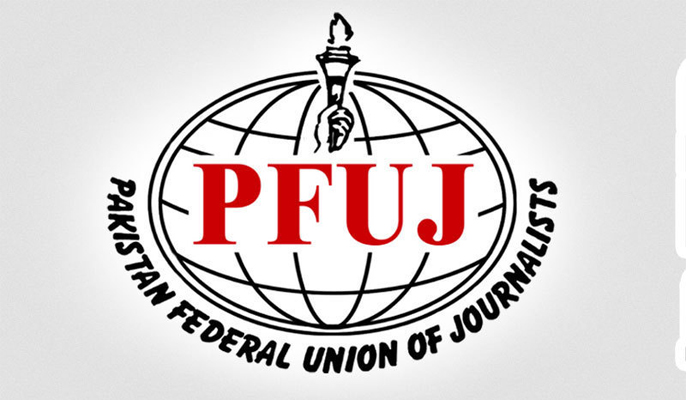PFUJ asks govt for urgent legislation to protect journalists
ISLAMABAD: International and national journalists’ organisations Monday called upon countries to end impunity for crimes against journalists.
Committee to Protect Journalists (CPJ), Pakistan Federal Union of Journalists (PFUJ), Karachi Union of Journalists (KUJ) and Rawalpindi-Islamabad Union of Journalists (RIUJ) issued separate statements and gave interviews as ‘International Day to End Impunity for Crimes against Journalists and Media’ was observed globally, including Pakistan, on November 2.
Pakistan Federal Union of Journalists (PFUJ) and press freedom organisation Freedom Network (FN) jointly called on the federal government to do legislation on protection of journalists, says a press release.
“As Pakistan remains among the top 10 countries, where predators of attacks on journalists and media, go unpunished, we demand urgent legislation to protect journalists and reverse the current situation affecting freedom of expression negatively,” both PFUJ and FN said.
No-one was punished through the court of law for crimes against journalists in Pakistan so far, they said. “Thus, Pakistan is among few countries where impunity for crimes against journalists is taking deep roots. Independent and professional journalism is not possible in such environment of fears. We cannot afford any further delay in doing the legislation,” the two organisations reminded the federal government, asking the federal cabinet to quickly approve the draft law on journalists’ protection, which Federal Minister for Human Rights Shireen Mazari prepared after consultation with stakeholders.
The United Nations General Assembly proclaimed 2 November as the 'International Day to End Impunity for Crimes against Journalists' in General Assembly Resolution A/RES/68/163. The resolution urges the UN member states to implement definite measures countering the present culture of impunity.
In Pakistan, over 130 journalists were killed since 2002 and no single killer of single murdered journalist was punished encouraging total impunity for murderers. Besides fatal attacks, journalists face other categories of threat such as physical attack, kidnapping, enforced disappearance, imprisonment and torture. Harassment and other harmful acts are increasingly prevalent in the online sphere, and are especially dire for women journalists, the United Nations Educational, Scientific and Culture Organisation (Unesco) spearheading campaign for impunity for crimes against journalists said to mark the occasion, says the joint statement.
Expressing its serious concerns, the KUJ said the crimes against journalists were increasing in Pakistan instead of registering a drop. The KUJ General Secretary, Faheem Siddiqui, said that in the current year the FIA and the police registered cases against a number of journalists.
Similarly, those who abducted reporters Ali Imran and Matiullah Jan could not be brought to the book. The KUJ demanded of the government to address the prevailing insecurity among the journalists and ensure freedom of journalism and safety of journalists.
The CPJ in its report warned that incremental progress toward reducing the murders of journalists worldwide is fragile and could be thwarted by legal appeals and lack of political leadership.
CPJ’s annual Global Impunity Index, which spotlights countries where journalists are singled out for murder and their killers go free, showed little change from a year earlier. Somalia, Syria, Iraq, and South Sudan occupy the worst four spots on the list, in that order, as war and political instability perpetuate the cycle of violence and lawlessness.
But each year the index includes more stable countries where criminal and political groups, politicians, business leaders, and other powerful actors resort to violence to silence critical and investigative journalists. CPJ has found that corruption, weak institutions, and lack of political will to pursue robust investigations are all factors behind impunity in these countries, which include Pakistan, Mexico, and the Philippines.
Pakistan and the Philippines have been mainstays on the Global Impunity Index since its inception in 2008. The Philippines is the biggest mover in this year’s rankings, improving from the fifth worst country worldwide to the seventh worst.
A German media outlet interviewed CPJ's Advocacy Director Courtney Radsch. The CJJ official said that “the numbers of journalists murdered show us that globally, it’s still an incredibly dangerous time to be a journalist, and existing threats to the physical safety of journalists are further compounded by the ongoing global pandemic and political unrest in many parts of the world.”
According to data from CPJ, 86 percent of killed journalists worldwide are murdered with impunity. Can you explain why almost 9 out of 10 murders go unpunished?
There are a number of reasons journalist murders so often go unpunished. One is lack of political will. The sad truth is that very often the masterminds of journalists’ murders are either in power or very close to those in power. Even when elected officials may be interested in seeking justice, they may be deterred by threats to their power or personal safety. These problems are compounded when governments lack the infrastructure and institutions to pursue justice, such as independent investigative bodies or an independent judiciary. Given these challenges, impunity often becomes an intractable cycle. Most countries on our list show up year after year. Even if there are arrests or convictions, often the masterminds behind murders remain at large and don’t face any consequences.
When world leaders are silent on cases of murdered journalists, rather than publicly supportive of efforts to secure justice, they send a signal that the murder of a journalist is not that big of a deal. But there are lives at stake, so we can’t afford for world leaders to shrug off impunity. As long as impunity continues in these countries, journalists will never be truly safe.
In terms of appeals, what we see is that even in rare instances where there were convictions, like in the case of Daniel Pearl in Pakistan, rulings can be overturned. In April the courts overturned the murder convictions of the four men accused in the 2002 killing, upending the progress made. While the Pearl family has appealed, it means they still don’t have resolution in the murder of their son, which is an incredibly painful experience for any family to go through. And there is no doubt this is in part due to a lack of political leadership to ensure justice is achieved in this case.
Each year, the Impunity Index includes more stable countries, where critical and investigative journalists are at the receiving end of violent attacks. In which of these countries have you seen the most drastic changes when it comes to journalists' safety?
Beyond murders of journalists, many if not all of the countries on this list have deeply concerning press freedom records. For example in Brazil and India, both democratic countries, we have reported on an alarming crackdown on the press in recent years, including attacks on journalists at protests, legal threats designed to censor outlets, and targeted online harassment, including by top political leaders.
-
 Prince William Relying On TWO Royals For ‘valuable Support’
Prince William Relying On TWO Royals For ‘valuable Support’ -
 Demi Lovato Gets Honest About Her 'bratty' Behavior During Disney Days
Demi Lovato Gets Honest About Her 'bratty' Behavior During Disney Days -
 Megan Fox Makes Blunt Admission About Never Loving Her Body?
Megan Fox Makes Blunt Admission About Never Loving Her Body? -
 Princess Diana Relished THIS British ‘comfort Food’, Reveals Expert
Princess Diana Relished THIS British ‘comfort Food’, Reveals Expert -
 Ryan Gosling Reveals Secret Role Played By His Daughters In 'Project Hail Mary'
Ryan Gosling Reveals Secret Role Played By His Daughters In 'Project Hail Mary' -
 Kate Middleton ‘powerful Style Statement’ Keeps Away From ‘distractions’
Kate Middleton ‘powerful Style Statement’ Keeps Away From ‘distractions’ -
 Madeline Ross, Sister Of Popular Streamer Adin Ross, Dies At 36
Madeline Ross, Sister Of Popular Streamer Adin Ross, Dies At 36 -
 Princess Diana Disliked ‘silly’ Day Celebrated By Youth
Princess Diana Disliked ‘silly’ Day Celebrated By Youth -
 Nicole Kidman Says ‘I Can Remove All The Organs’ Ahead Of New Role
Nicole Kidman Says ‘I Can Remove All The Organs’ Ahead Of New Role -
 US Banks On High Alert For Cyberattacks As Political Tension Escalates
US Banks On High Alert For Cyberattacks As Political Tension Escalates -
 Rebecca Gayheart Marks Daughter Special Day 12 Days After Eric Dane's Death
Rebecca Gayheart Marks Daughter Special Day 12 Days After Eric Dane's Death -
 Sarah Ferguson Only Held Daughters For The Sake Of ‘cameras’
Sarah Ferguson Only Held Daughters For The Sake Of ‘cameras’ -
 Rachel Reeves Predicts UK Economy Will Outperform Forecasts, But Experts Remain Cautious
Rachel Reeves Predicts UK Economy Will Outperform Forecasts, But Experts Remain Cautious -
 Hailey Bieber Reveals Doctors Warned Her Not To Get Pregnant: 'It Was A Surprise'
Hailey Bieber Reveals Doctors Warned Her Not To Get Pregnant: 'It Was A Surprise' -
 Jeff Bezos's Wife Lauren Sánchez Recalls Most 'special' Moment From Italy Wedding
Jeff Bezos's Wife Lauren Sánchez Recalls Most 'special' Moment From Italy Wedding -
 Selena Gomez Discusses The 'coolest' Milestone She Shares With BFF Taylor Swift
Selena Gomez Discusses The 'coolest' Milestone She Shares With BFF Taylor Swift




